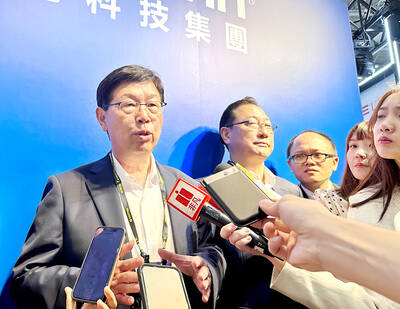The nation’s shipbuilding sector is undergoing a renaissance, Department of Statistics Deputy Director-General Wang Shu-chuan (王淑娟) said by telephone yesterday, one day after a Ministry of Economic Affairs (MOEA) report said the sector’s production value last year surged 25.2 percent to NT$27.1 billion (US$895.87 million at the current exchange rate).
The surge was largely due to growing demand from the offshore wind energy industry and domestic submarine projects, the report said.
There was also an increase in the production of large and small container ships, with production value increasing by 35.2 percent on an annual basis to NT$19.8 billion, while yacht manufacturing output grew 9.4 percent to NT$6.4 billion, the report said.
“The sector is witnessing a renaissance mainly due to the construction of offshore wind farms and the government’s plan to manufacture naval vessels locally,” Wang said.
“Exports now make up a majority of yacht orders, with the US as Taiwanese makers’ greatest client,” she said, adding that exports last year totaled US$231.55 million, a 38 percent increase from 2018.
Local yacht makers clinched the most orders last year among Asian firms, she said, citing data from Boat International Media.
However, whether Taiwanese firms will be able to maintain the momentum amid the COVID-19 pandemic is not clear.
“The demand for container ships is likely to falter this year as wind farm developers move on to the next phase in construction... However, this might boost orders for wind turbine installation vessels and the like,” Wang said.
“What we fear is the growing volatility across international markets fostered by fears about the spread of COVID-19,” she said.
The sector might see a decline similar to that during the 2008 global financial crisis, she said.
The sector’s production plummeted 21.1 percent in 2009, to NT$38.7 billion, from NT$49.1 billion in 2008, the ministry’s data showed.
“The fall in global trade [during 2008-2009] dealt a heavy blow to the local production of container ships,” Wang said.
While it is too early to make predictions, the sector would be affected if the pandemic continues, even though production of submarines might continue as planned, she said.

Taiwan Transport and Storage Corp (TTS, 台灣通運倉儲) yesterday unveiled its first electric tractor unit — manufactured by Volvo Trucks — in a ceremony in Taipei, and said the unit would soon be used to transport cement produced by Taiwan Cement Corp (TCC, 台灣水泥). Both TTS and TCC belong to TCC International Holdings Ltd (台泥國際集團). With the electric tractor unit, the Taipei-based cement firm would become the first in Taiwan to use electric vehicles to transport construction materials. TTS chairman Koo Kung-yi (辜公怡), Volvo Trucks vice president of sales and marketing Johan Selven, TCC president Roman Cheng (程耀輝) and Taikoo Motors Group

Among the rows of vibrators, rubber torsos and leather harnesses at a Chinese sex toys exhibition in Shanghai this weekend, the beginnings of an artificial intelligence (AI)-driven shift in the industry quietly pulsed. China manufactures about 70 percent of the world’s sex toys, most of it the “hardware” on display at the fair — whether that be technicolor tentacled dildos or hyper-realistic personalized silicone dolls. Yet smart toys have been rising in popularity for some time. Many major European and US brands already offer tech-enhanced products that can enable long-distance love, monitor well-being and even bring people one step closer to

RECORD-BREAKING: TSMC’s net profit last quarter beat market expectations by expanding 8.9% and it was the best first-quarter profit in the chipmaker’s history Taiwan Semiconductor Manufacturing Co (TSMC, 台積電), which counts Nvidia Corp as a key customer, yesterday said that artificial intelligence (AI) server chip revenue is set to more than double this year from last year amid rising demand. The chipmaker expects the growth momentum to continue in the next five years with an annual compound growth rate of 50 percent, TSMC chief executive officer C.C. Wei (魏哲家) told investors yesterday. By 2028, AI chips’ contribution to revenue would climb to about 20 percent from a percentage in the low teens, Wei said. “Almost all the AI innovators are working with TSMC to address the

FUTURE PLANS: Although the electric vehicle market is getting more competitive, Hon Hai would stick to its goal of seizing a 5 percent share globally, Young Liu said Hon Hai Precision Industry Co (鴻海精密), a major iPhone assembler and supplier of artificial intelligence (AI) servers powered by Nvidia Corp’s chips, yesterday said it has introduced a rotating chief executive structure as part of the company’s efforts to cultivate future leaders and to enhance corporate governance. The 50-year-old contract electronics maker reported sizable revenue of NT$6.16 trillion (US$189.67 billion) last year. Hon Hai, also known as Foxconn Technology Group (富士康科技集團), has been under the control of one man almost since its inception. A rotating CEO system is a rarity among Taiwanese businesses. Hon Hai has given leaders of the company’s six